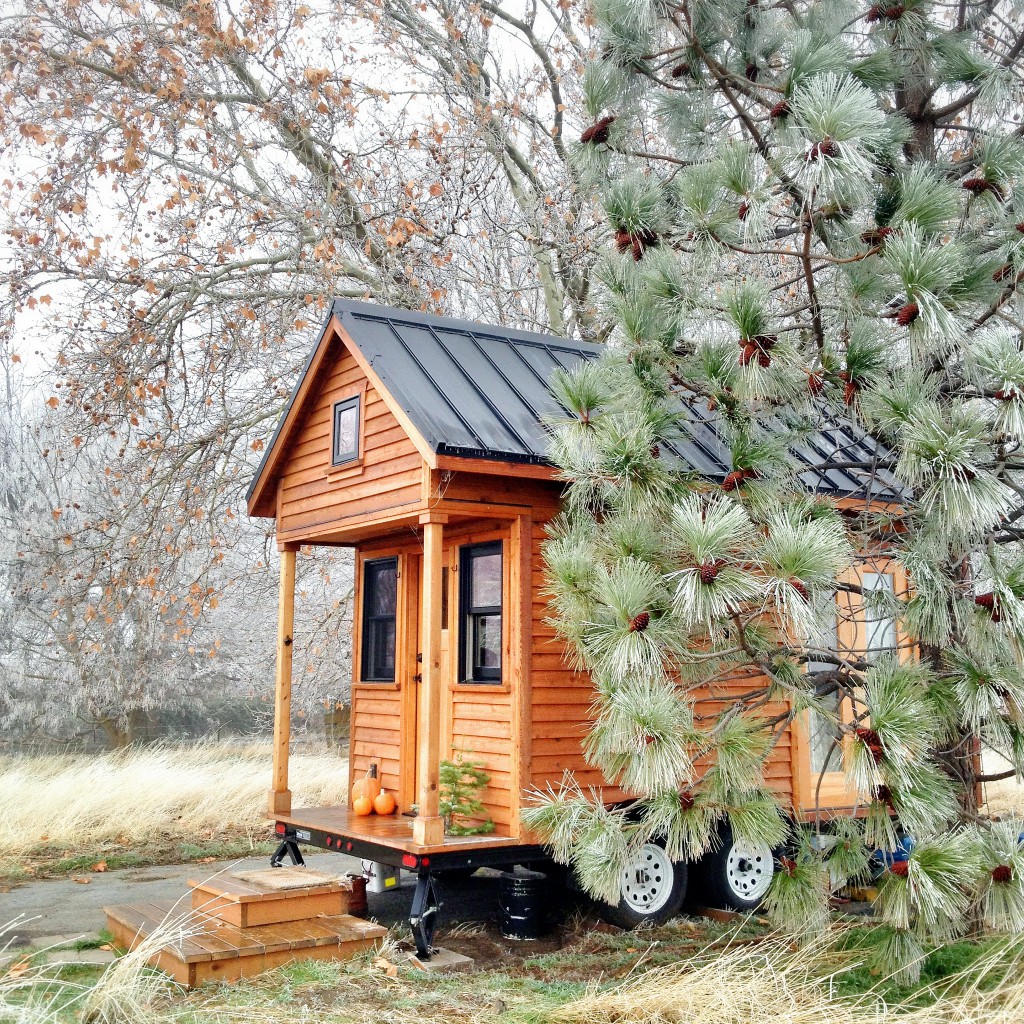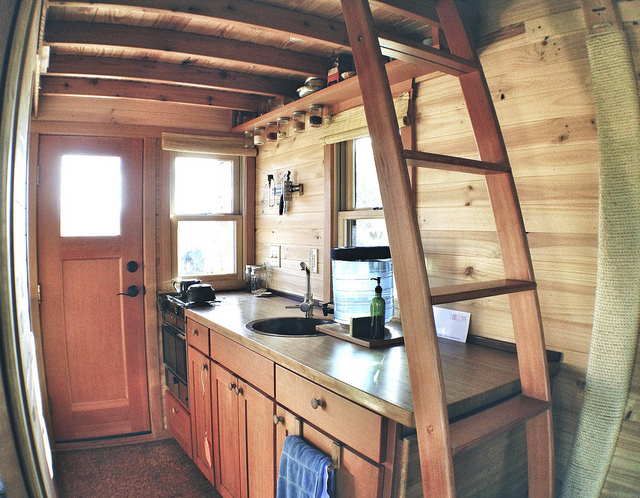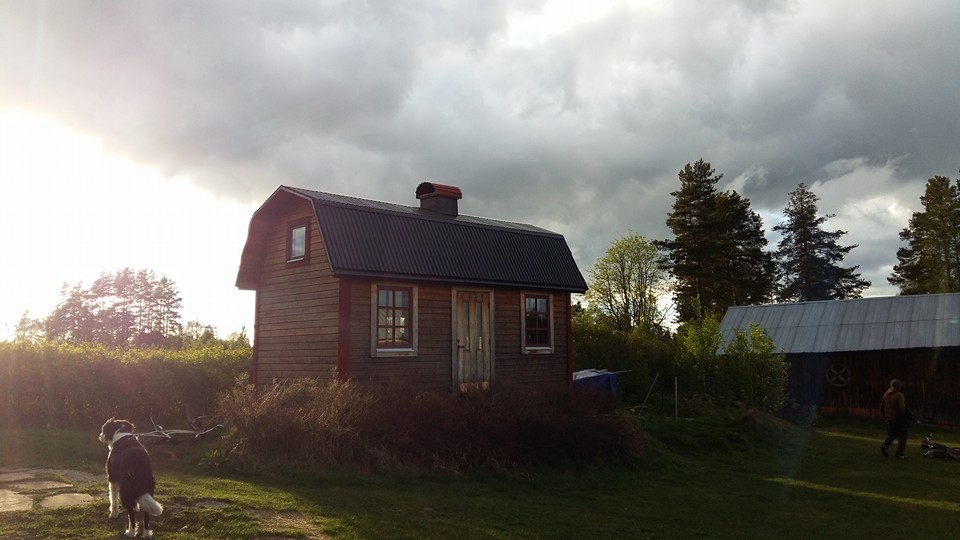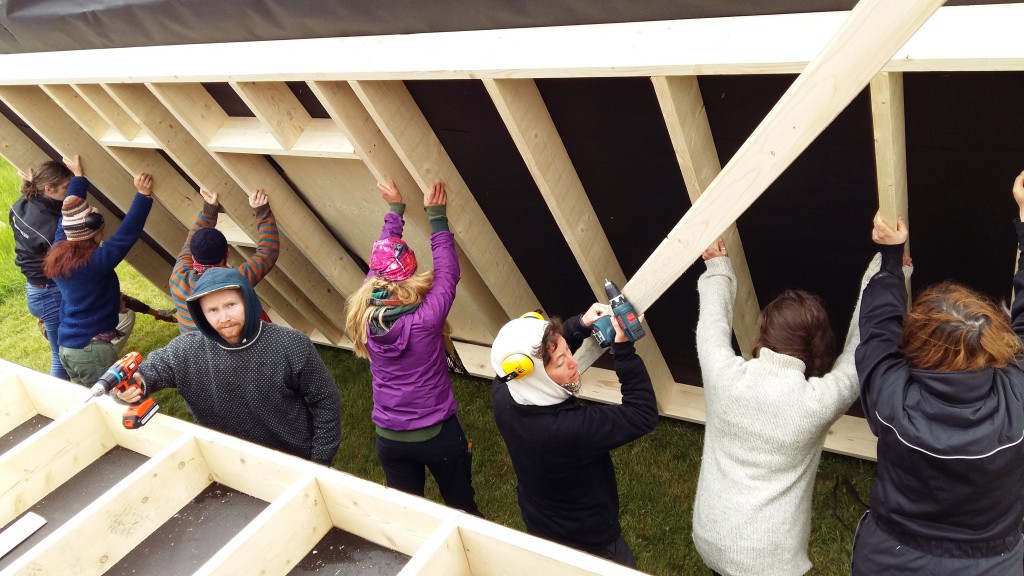Markus Skoog lives in self-built house on wheels and works only eight days a month. ”A different life” met him for an interview.
Läs den här texten på svenska >>
It’s eleven o clock on a workday in the middle of the week when 34-year-old Markus and I talk about the unexpected turn that his life has taken during the past six years. While most others are at work Markus is preparing to leave his tiny home on wheels and head into the beautiful forests of Dalarna in Sweden for a walk with his dog. He is done working for this month. Markus combines eight days of full-time work in a home for unaccompanied refugee children with 22 free days each month. The combination results in a total of nine months of vacation each year.
The income is sufficient to cover his monthly expenses of 5000 Swedish krona and to insert a nice amount of money into the savings account. Markus spends his free time on things that he considers important in life; personal development, relationships, volunteering and activism in the issues that he is passionate about. He is interested in sustainable living and runs the blog Att leva det levande livet, which translates to “To live a life that is alive” and a facebook page with the same name. Recently, he held his first course on the subject “How to build a tiny house on wheels.”
– “It was fun! There is a lot of interest. After just one week over 1700 people applied for the course. There was space for 11, and I had only announced the course on the facebook page. A female friend who wants to live in a tiny house on wheels provided all the material and will keep the house. I held the course and the course participants paid 2500 Swedish krona for a five-day course”, says Markus. A win-win situation for everyone involved. Markus interest in sustainable building in combination with a growing demand for tiny homes inevitably means that more construction courses will follow.
Markus recently managed to achieve his dream of buying a piece of land in Skattungbyn, a small village outside Orsa in northern Dalarna and he speaks with appreciation and gratitude when he talks about his life. But it wasn’t long ago that his life situation was quite different.
– “For over ten years I worked full-time as a carpenter on a major construction company in Stockholm. I lived in a big house, had a girlfriend, dog and commuted two hours to work. A fairly common big-city life.”
He laughs as he describes himself.
– “I was quite noisy and all over the place. I used to be a typical macho man and in general a pretty annoying person.”
– “I guess I was dissatisfied”, he adds thoughtfully. “It’s difficult to develop on a personal level when you work seven to four, lose two hours on commuting, two on exercise and then you need time for your relationship, for taking care of the dog… you barely have time to hang out with friends, you have no time to think freely and contemplate about who you are, who you are becoming and who you want to be. I felt that the city dust that I walked around in every day got glued to my soul. I became dusty and boring and trapped. I didn’t fit in the context and felt a deep dissatisfaction with my existence.”
The growing discontent eventually made Markus leave the big city life and follow his dream. During a date that Markus went on the girl he met told him about a course that focuses on organic farming and sustainable living in Skattungbyn. Markus became curios and the curiosity eventually resulted in an application, admission and a move to Dalarna.

Markus first tiny home on wheels was no more than seven square meters. His current house on wheels is 17 square meters. Photo: Markus Skoog
In Skattungbyn, where the demand for housing was big, Markus got inspired by people who lived a simple life in small houses on wheels. So when two classmates made plans to build their own tiny homes and asked Markus for help he was quick to join them.
– “When I lived in Stockholm I had no idea that you could do something like this. I didn’t know anyone who had done something similar. There were no blogs on the subject at the time, that’s why I started my blog.”
Many former participants have chosen to stay in the village which is characterized by a mixture of ”ordinary” villagers and newcomers who are drawn to the villages alternative courses, collectivist spirit, minimalism and sustainability in focus.
Life in the village differs in many aspects from life in Stockholm. Markus now lives at 17 m², arrives to work in just 15 minutes and shares food expenses with nine other people who take turns cooking for one another which means that Markus only cooks every ninth day and gets served food the remaining days.
The village has a purchasing association that buys cheap food directly from the food companies which results in monthly food budget of 700 Swedish krona per person and month. Due to limited public transportation villagers need access to cars. To reduce costs and negative environmental impact car pooling is standard procedure. Free shops, exchange groups and labour exchanges are also common. Most of it functions on an entirely voluntary basis and everyone helps out. Markus borrows a tractor from the neighbour when he moves his house, the neighbour gets help with carpentry later. Everything goes around.
The lifestyle involves a different approach to other people:
– “In Stockholm you constantly meet new people and find yourself in new contexts. You can behave like an asshole in one context and then switch to another without any consequences. In the village you can’t do that. Everybody knows each other, helps each other and needs each other in different ways. You meet each other all the time and you are each other’s context. Because of that you can’t be an asshole.”
Moving to a 17 m² house on wheels didn’t only mean reduced spendings and a new lifestyle but also time for reflection.
– “I think that it’s hard to be a complete person during a 40-hour working week. You become shaped by the workplace where you must be competitive and efficient. You don’t have time to think, it is not possible … To reflect on important questions; Why do I have what I have? What’s more important to me – the stuff that exists in the rooms or the stuff that happens in the rooms? What is it to be human and what is it that gives us deep satisfaction? It feels like we forget what is important in life. Now I have had time to think more about all that stuff and can consciously decide in which direction I want to strive.”
But it was not an obvious choice for Markus to settle in the village. After the first course he moved back to the big city for a while and studied. It was not until a few years later when he wanted to take a new course that he returned to the village and remained there. At first it was tough to find a role and fit in among the locals but Markus knowledge, skills and commitment was appreciated and he soon found the context and the satisfaction that he lacked in the big city. In the village he also found more of himself.
– “I am a totally different person now. I can show emotions, I am more harmonious, creative and a softer human being. I have time for volunteering and can build stuff that doesn’t revolve around money or is based on a competitive mindset. Here it is more about love, relationships, friendships. I have much more profound relationships today and that’s good for the soul.”
Spending time doing things that we are passionate about is also good for the soul. Markus is interested in recycling and ecological construction. He’s received a barn from a friend and old windows from other villagers. Currently, he is searching for old bricks to build a chimney. After the move to the new site that he has bought he wants to continue to share his knowledge by organizing courses and festivals in ecological building methods. At the same time, he wants to keep his current job which he finds very rewarding.
To have income from several independent sources provides a good foundation but the path has been paved with challenges. One of the biggest challenges when Markus decided to live a more vibrant life was the lack of like-minded people in his surroundings.
– “The most important thing is to have a role model, someone who does what you want to do or lives the way you want to live. If you find one like-minded person there’s suddenly a whole field of them in front of you, because that one person knows many more and they can help you see opportunities and acquire information and knowledge that you can’ find elsewhere. You have to find that one first person, then everything becomes much easier.”
 Another challenge was to deal with the reactions from others. Even Markus closest friends and family initially had a difficult time understanding Markus decision.
Another challenge was to deal with the reactions from others. Even Markus closest friends and family initially had a difficult time understanding Markus decision.
– “Parents always think that their way is the best way and that it is safe to walk in their footsteps. They were obviously worried and they were probably particularly anxious when I wasn’t working. They reminded me of the need for retirement savings and they probably thought that my life was about to derail. But they have dealt with my decision better and better as time has passed and now they also see that I feel much better than I did before.”
Because Markus has a public online profile he also faces the reactions from strangers and has sometimes had to deal with negative comments about his lifestyle. To be confronted with a different way of life seems to scare some people and cause them to react with hostility and aggression.
– “But I think it’s like that … I think that people become scared and anxious when they don’t understand something. It’s just like with racism… people who say stupid things. I think it’s because it triggers something in them which they find difficult to understand and relate to.”
To not work full time is something that often gets stigmatized, whether it is self chosen or not. Some people easily assume that you are lazy or that you live from social benefits. Oftentimes the prejudice derives from ignorance. Markus has never used financial support and many people in Skattungbyn consciously choose not to work full time. Instead, the alternative economy has grown big. The unity and collective spirit found in the village is in fact dependent on the residents working part-time jobs and involving in volunteer work during their spare time. The fact that many chose not to work full-time becomes the foundation of a sustainable society.

Inside of a tiny house on wheels in the United States. Photo: Tammy Strobel / rowdykittens.com
– “People are convinced that we do not contribute to society unless we work full time, but what is it that we really contribute to when we actually do work full time? When we make more money we inevitably consume more and thus use more resources. It affects both the environment and the poorest people in the world and has a negative impact on society as whole. Working less is even on a global level the best thing an individual can do to contribute to a more sustainable development,” says Markus.
Despite this, many of Markus acquaintances who live in tiny homes chose to be private about ther lifestyle because of the stigma attached to it.
– “Sometimes it seems that some people are bothered by those who have a very good life. In those moments I just feel like saying ”Come here and I’ll give you a hug, you seem to need one,” says Markus. “But the negativity is easier to handle now. When you feel peaceful and loving yourself you can handle it well,” he says.
But although some comments are negative the vast majority seems to think that Markus is doing something good and treats him with respect. And Markus continues his life’s journey on his own terms.
– “You choose your life every day, through every decision you make. I want to be happy and kind, so I try to be. But it has taken a long time for me to become an easy going person! There have been tough periods of intense personal growth,” he adds with a laugh.
If Markus goal was to become a kind and easy going person he seems to have succeeded. During our conversation he speaks with calmness in his voice regardless of the subject we talk about. He doesn’t idealise and he makes no attempt to impose his life philosophy on me. He simply tells me his story, no more no less, and it’s up to me what I make of it. I personally can’t help becoming inspired by it. Both by Markus life choices and by the security that permeates his voice. That inner security that we feel when we are satisfied with ourselves and our life.
And I’m far from the only one inspired. Markus sometimes get asked to build tiny homes on wheels for others who are tempted to live a different kind of life.
– “I offer free advice and can sometimes agree to build if I choose to spend my time on it, but I always recommend that you do it yourself if you can. Today, there is so much information online and many courses that teach you how to build. There is great value in building one’s own houses. You learn, you grow as a person and it will be a house you know. When you think about it, it’s only barely the last hundred years that we don’t build our houses ourselves.
To build a complete 18 m² tiny home on wheels is expected to take a couple of months if you build full time. The material costs can vary significantly. In North America many tiny homes tend to be quite luxurious while the tiny house movement in Sweden is more basic. Roughly estimated material costs tend to be around SEK 100 000, rounded up. Labour might cost approximately the same amount, which adds up to a total cost of approximately SEK 200 000. *
But Markus makes it clear that a tiny house on wheels is not the solution for everyone. Markus knew he wanted to live simply in a house and that one day he wanted to buy his own land, but he did not know where this would be. Therefore a house on wheels was good and cheap solution for him.
– “But if someone just copies what I have done is not certain that it will work for them,” he says. It is important not to focus on a housing option just because you see others choosing that option. Each person must always base their decision on their personal needs, circumstances and resources in order to create a solution that suits them,” says Markus.
Many people hesitate creating a lifestyle change a long time and experience a resistance even once they have made their decision.
– “Sometimes people contact me and ask how they can go about to create a difference in their lives. They say they are tired of their life and want a change. I inform them about the possibility of selling a car, changing insurance company, selling the house and so on. But then they start telling me that it is not possible for various reasons. People create excuses. That’s when I understand that this person wants a change without changing anything. And if you don’t want to change anything nothing will change, that goes without saying. In that case you will continue to be stressed and you will continue to lack time for your children and grandchildren and so on. People get stuck in that kind of thinking. If you want a different life you must dare to sacrifice something.”
– “There’s really no reason in Sweden to be as indebted as we are,” says Markus. “People pay so much money for storage – storage in the shape of residential space that is not being used. Parents whose children have moved out often have a lot of things that take up space but never get used. Large living areas result in higher heating costs. Many complain that the retirement money is not enough. But if you move into a house that is adapted to two people and exchange an area of 110 m² for 50 m²the money will suffice excellently. We all have to make the best of our situations. Many people are have the possibility to create a great situation for themselves but get stuck in an old mindset, or fear of change. I think it’s because we are creatures of habit. We know what we have but not what we might get.
Insulation can be tricky, but there are a great value in building a house by yourself according to Markus. Photo: Markus Skoog
 Based on your experience, how do you reckon we can move away from that locked mindset and change our patterns once we notice that they affect us negatively?
Based on your experience, how do you reckon we can move away from that locked mindset and change our patterns once we notice that they affect us negatively?
– “I don’t know how to break away from them and I don’t see myself as a role model”, Markus replies, “but if I could convey one thing with my way of life, it would be to dare to try something! If you are facing a dead end road or becoming depressed due to your life situation, take a step in any direction and try something different – just to see how it goes. You maybe want to dance? Try! If it wasn’t your thing then at least you know that now. You have learned something, and then you can try something new instead.”
– “We only have one life as far as we know. It’s a shame that we often think that ”when I retire I will do …” But it’s not certain that it will be possible then. Do it now! Now is as good time as any. And you can always change your mind, so go for it! The only things you can’t change your mind about once you had them are children and tattoos, other than that you can change your mind about pretty much anything!”
* Costs of materials and labour vary significantly and depend, among other things, on the choice of materials and construction firm. Figures are only approximate and based on Markus personal experience.
Are you eager to downshift in your life but unsure of how to proceed? Follow the article series which will end with an online workshop called ”Downshifting for beginners”. Like “Ett annat liv” on Facebook to make sure that you don’t miss out on the next part.
For mor inspiring articles and interviews like this one Like ”A different life” on Facebook:









This looks like an amazing idea! Love that new little space!
Kommentarer är stängda.